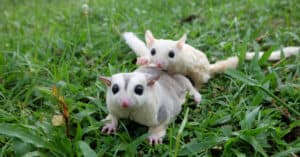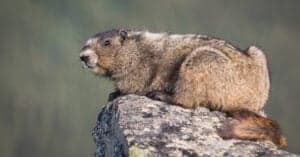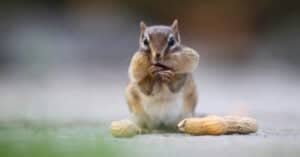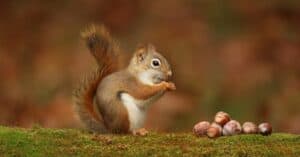Flying Squirrel vs Sugar Glider: What Are The Differences?
@media (min-width: 481px) {
.mobile-top-content {
display: none;
}
}
#mobileTopContentCTACarouselControls { overflow: hidden; text-overflow: ellipsis; white-space: nowrap; }
.mobile-top-content .more { color: #fff; }
.mobile-top-content a { color: #fff; text-decoration: underline; }
.mobile-top-content a:hover { color: #fff; text-decoration: underline; }
@media (max-width: 480px) {
.mobile-top-content {
background-color: #06a10b;
color: #fff;
text-align: center;
/*height: 60px;
padding-top:5px;*/
font-size:80%;
/* display: block; */
margin: 0px -30px;
}
}
You may not have realized it, but there are many differences between a flying squirrel vs sugar glider. While both of these animals are unique and precious exotic pets, they belong to very different species as well as habitats in the wild. They are also different in their classification, as flying squirrels are mammals and sugar gliders are marsupials.
In this article, we will address all of the differences between these two animals, as well as their physical appearances so that you can learn how to tell them apart. We will also discuss their preferred habitats and geographical locations along with their diets and social behaviors. Let’s get started and talk about these two animals now!
Comparing Flying Squirrel vs Sugar Glider
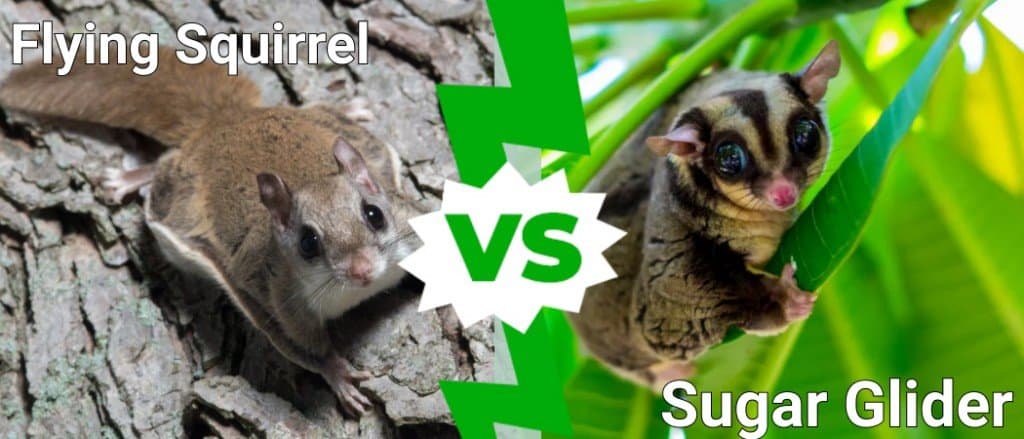
A-Z-Animals.com
| Flying Squirrel | Sugar Glider | |
|---|---|---|
| Genus | Sciuridae | Petaurus |
| Appearance | Often much larger than sugar gliders and found in a wide variety of colors; has membrane for flying | Smaller than flying squirrels and striped; membrane for flying and pouch on female sugar gliders for their young |
| Location | Europe, Asia, North America, Mexico, and Central America | Australia and New Guinea forested areas |
| Size | 5-14 inches; 2-5 ounces | 4-7 inches; 3-6 ounces |
| Diet | Insects, flowers, bird eggs, nuts, fungus, and fruit | Tree sap, small mammals, reptiles, insects |
Key Differences Between Flying Squirrel vs Sugar Glider
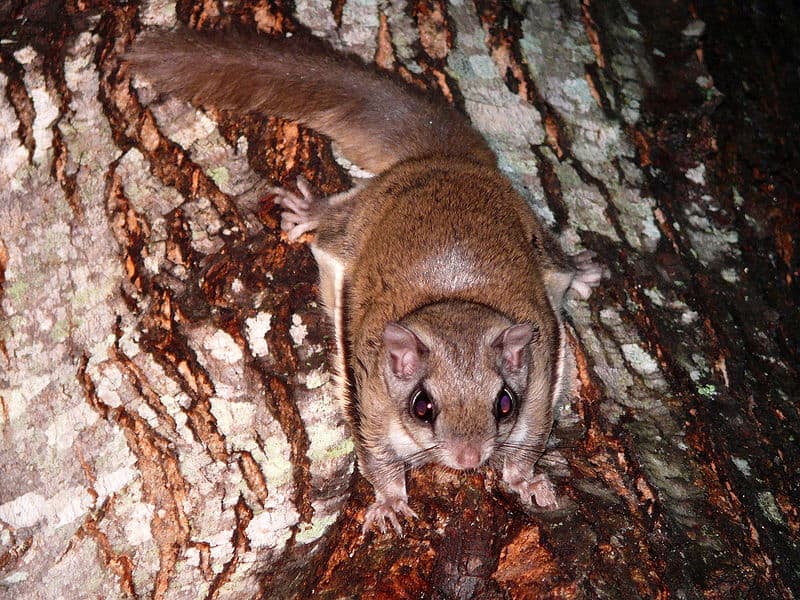
Ken Thomas – Public Domain
There are many key differences between a flying squirrel vs sugar glider. The main difference between these two animals is their classifications, as sugar gliders are marsupials, while flying squirrels are mammals. The size differences between a flying squirrel and sugar glider are also more extreme, and their preferred locations and habitats differ from one another as well.
Let’s take a look at some of these differences in more detail now.
Flying Squirrel vs Sugar Glider: Size
A primary difference when identifying a flying squirrel from a sugar glider is their size. The average flying squirrel is 5-14 inches long and 2-5 ounces in weight, while sugar gliders are 4-7 inches in length and 3-6 ounces on average. It is interesting to note that sugar gliders often weigh more than flying squirrels, despite their smaller frames.
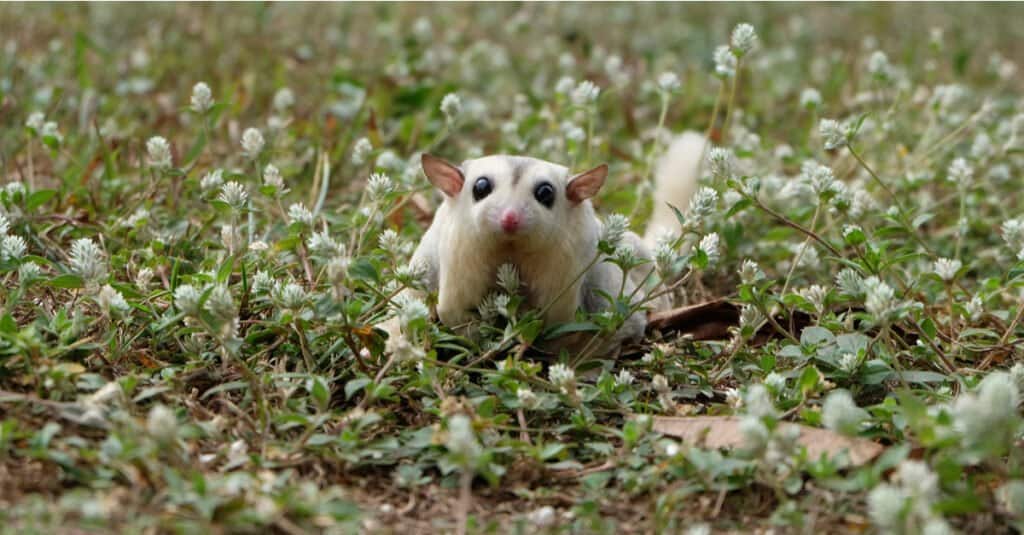
i3iwtz/Shutterstock.com
Flying Squirrel vs Sugar Glider: Social Behavior
While both flying squirrels vs sugar gliders are active at night, they differ in their social structure and behavior. For example, flying squirrels live in groups of eight or fewer squirrels with little issues, while sugar gliders live in colonies of a dozen or more with two male leaders that assist with protecting the other gliders and their young.
While both of these animals are known for the gliding or flying behavior, they differ in the way that they accomplish this. Sugar gliders can only fly around 100 feet before touching the ground, while flying squirrels can reach closer to 300 feet before touching the ground. However, both of these animals average flight distances of 50-65 feet in their day to day lives.
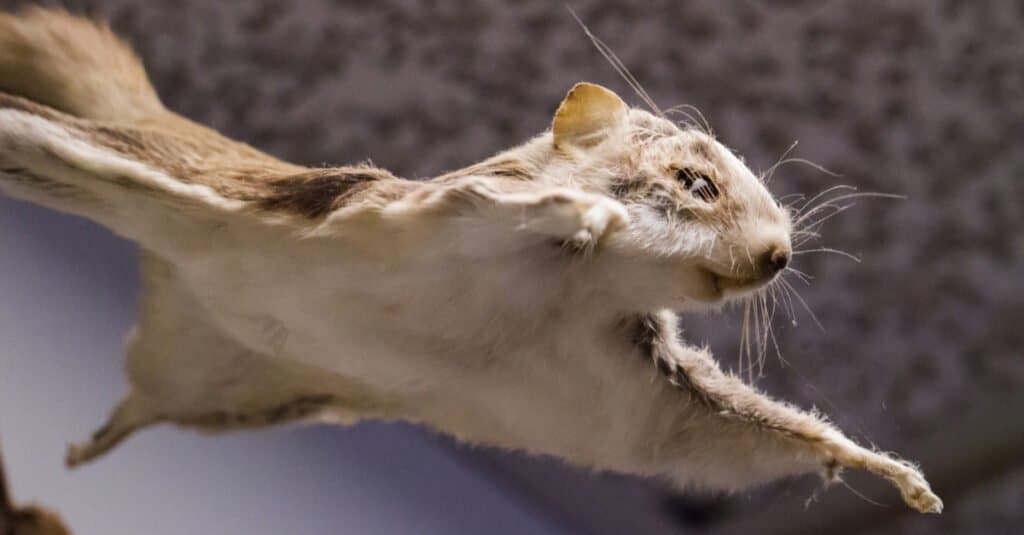
Laura Fiorillo/Shutterstock.com
Flying Squirrel vs Sugar Glider: Appearance and Coat Colors
Another difference between flying squirrels vs sugar gliders is their appearance and coat colors. Flying squirrels come in a variety of shades, from dark brown to red, while sugar gliders are typically found in brown or gray colors. In addition, sugar gliders have a striped pattern on their backs, while flying squirrels are typically one solid color.
While both of these animals have membranes attached to their side bodies for flying, sugar gliders have more defined digits when compared to flying squirrels. They have an extra digit that resembles our thumb, while flying squirrels do not have as defined a digit.
While you may not notice this unless you are comparing a female flying squirrel with a female sugar glider, there is another key difference in their physical appearances. Sugar gliders are marsupials, which means that they keep their young in a pouch. Flying squirrels do not have a pouch, but you wouldn’t notice this unless you were comparing the two side by side.
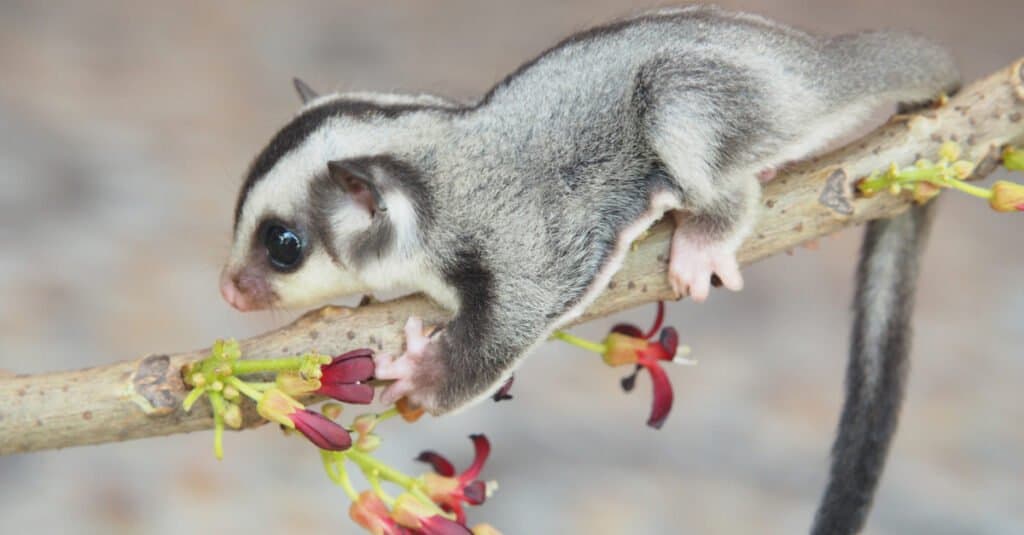
AsepBachowie/Shutterstock.com
Flying Squirrel vs Sugar Glider: Diet and Hunting Style
A flying squirrel vs sugar glider has a different diet and hunting style. While both of these animals are omnivorous, a sugar glider eats tree sap, small mammals, reptiles,and insects, while a flying squirrel eats insects, flowers, bird eggs, nuts, fungus, and fruit. You see that some of their diets overlap, but there are some key differences here.
Sugar gliders enjoy eating their meals along the undersides of their tree canopies, while flying squirrels feed and whatever they can. Flying squirrels are also notorious hoarders, which is not something that sugar gliders are well known for.
Flying Squirrel vs Sugar Glider: Geographic Location
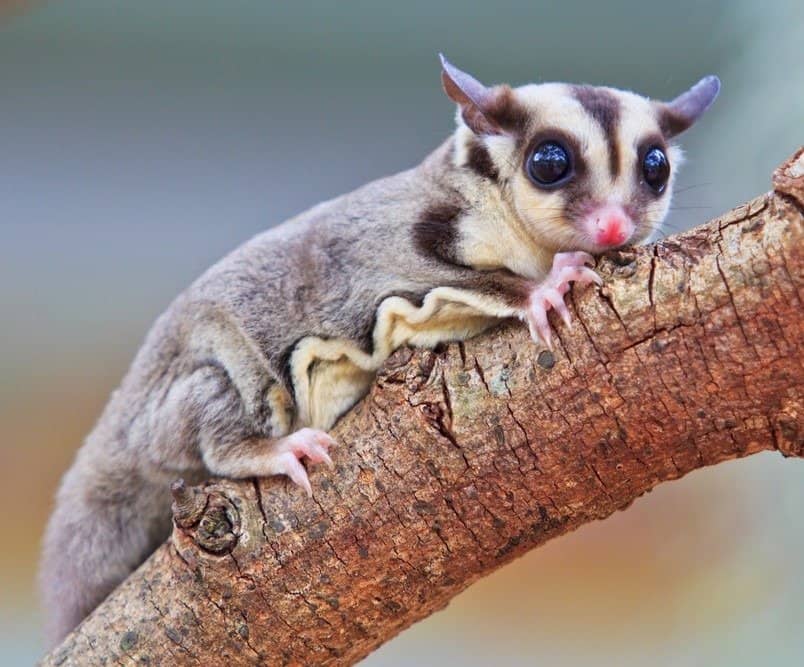
apiguide/Shutterstock.com
A final difference between a flying squirrel vs sugar glider is their geographic locations. Flying squirrels are found throughout the world, particularly in Europe, Asia, North America, Mexico, and Central America, while sugar gliders are found in Australia and New Guinea forested areas only.
This makes their preferred habitats very different as well. While both of these animals feel safe and secure in trees, flying squirrels are adapted to living in much colder locations when compared to sugar gliders. However, sugar gliders are capable of handling both extremely humid and dry locations.
More from A-Z Animals
.more-snake-card-image { max-height:140px !important; }
@media (min-width: 481px) {
.mobile-top-content {
display: none;
}
}
#mobileTopContentCTACarouselControls { overflow: hidden; text-overflow: ellipsis; white-space: nowrap; }
.mobile-top-content .more { color: #fff; }
.mobile-top-content a { color: #fff; text-decoration: underline; }
.mobile-top-content a:hover { color: #fff; text-decoration: underline; }
@media (max-width: 480px) {
.mobile-top-content {
background-color: #06a10b;
color: #fff;
text-align: center;
/*height: 60px;
padding-top:5px;*/
font-size:80%;
/* display: block; */
margin: 0px -30px;
}
}
You may not have realized it, but there are many differences between a flying squirrel vs sugar glider. While both of these animals are unique and precious exotic pets, they belong to very different species as well as habitats in the wild. They are also different in their classification, as flying squirrels are mammals and sugar gliders are marsupials.
In this article, we will address all of the differences between these two animals, as well as their physical appearances so that you can learn how to tell them apart. We will also discuss their preferred habitats and geographical locations along with their diets and social behaviors. Let’s get started and talk about these two animals now!
Comparing Flying Squirrel vs Sugar Glider

A-Z-Animals.com
| Flying Squirrel | Sugar Glider | |
|---|---|---|
| Genus | Sciuridae | Petaurus |
| Appearance | Often much larger than sugar gliders and found in a wide variety of colors; has membrane for flying | Smaller than flying squirrels and striped; membrane for flying and pouch on female sugar gliders for their young |
| Location | Europe, Asia, North America, Mexico, and Central America | Australia and New Guinea forested areas |
| Size | 5-14 inches; 2-5 ounces | 4-7 inches; 3-6 ounces |
| Diet | Insects, flowers, bird eggs, nuts, fungus, and fruit | Tree sap, small mammals, reptiles, insects |
Key Differences Between Flying Squirrel vs Sugar Glider

Ken Thomas – Public Domain
There are many key differences between a flying squirrel vs sugar glider. The main difference between these two animals is their classifications, as sugar gliders are marsupials, while flying squirrels are mammals. The size differences between a flying squirrel and sugar glider are also more extreme, and their preferred locations and habitats differ from one another as well.
Let’s take a look at some of these differences in more detail now.
Flying Squirrel vs Sugar Glider: Size
A primary difference when identifying a flying squirrel from a sugar glider is their size. The average flying squirrel is 5-14 inches long and 2-5 ounces in weight, while sugar gliders are 4-7 inches in length and 3-6 ounces on average. It is interesting to note that sugar gliders often weigh more than flying squirrels, despite their smaller frames.

i3iwtz/Shutterstock.com
Flying Squirrel vs Sugar Glider: Social Behavior
While both flying squirrels vs sugar gliders are active at night, they differ in their social structure and behavior. For example, flying squirrels live in groups of eight or fewer squirrels with little issues, while sugar gliders live in colonies of a dozen or more with two male leaders that assist with protecting the other gliders and their young.
While both of these animals are known for the gliding or flying behavior, they differ in the way that they accomplish this. Sugar gliders can only fly around 100 feet before touching the ground, while flying squirrels can reach closer to 300 feet before touching the ground. However, both of these animals average flight distances of 50-65 feet in their day to day lives.

Laura Fiorillo/Shutterstock.com
Flying Squirrel vs Sugar Glider: Appearance and Coat Colors
Another difference between flying squirrels vs sugar gliders is their appearance and coat colors. Flying squirrels come in a variety of shades, from dark brown to red, while sugar gliders are typically found in brown or gray colors. In addition, sugar gliders have a striped pattern on their backs, while flying squirrels are typically one solid color.
While both of these animals have membranes attached to their side bodies for flying, sugar gliders have more defined digits when compared to flying squirrels. They have an extra digit that resembles our thumb, while flying squirrels do not have as defined a digit.
While you may not notice this unless you are comparing a female flying squirrel with a female sugar glider, there is another key difference in their physical appearances. Sugar gliders are marsupials, which means that they keep their young in a pouch. Flying squirrels do not have a pouch, but you wouldn’t notice this unless you were comparing the two side by side.

AsepBachowie/Shutterstock.com
Flying Squirrel vs Sugar Glider: Diet and Hunting Style
A flying squirrel vs sugar glider has a different diet and hunting style. While both of these animals are omnivorous, a sugar glider eats tree sap, small mammals, reptiles,and insects, while a flying squirrel eats insects, flowers, bird eggs, nuts, fungus, and fruit. You see that some of their diets overlap, but there are some key differences here.
Sugar gliders enjoy eating their meals along the undersides of their tree canopies, while flying squirrels feed and whatever they can. Flying squirrels are also notorious hoarders, which is not something that sugar gliders are well known for.
Flying Squirrel vs Sugar Glider: Geographic Location

apiguide/Shutterstock.com
A final difference between a flying squirrel vs sugar glider is their geographic locations. Flying squirrels are found throughout the world, particularly in Europe, Asia, North America, Mexico, and Central America, while sugar gliders are found in Australia and New Guinea forested areas only.
This makes their preferred habitats very different as well. While both of these animals feel safe and secure in trees, flying squirrels are adapted to living in much colder locations when compared to sugar gliders. However, sugar gliders are capable of handling both extremely humid and dry locations.

